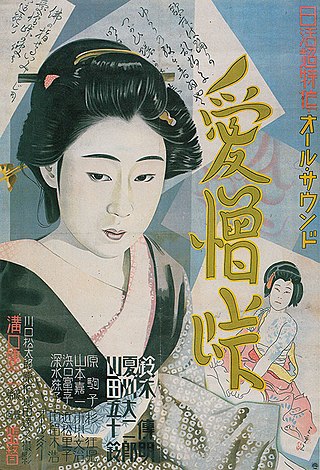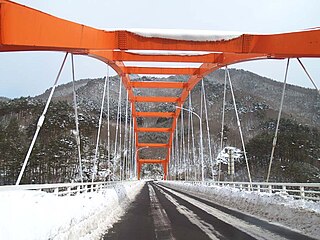Tōge or Touge may refer to:
- The Japanese word for mountain pass
- A style of street racing in Japan which takes place on winding mountainous roads
Tōge or Touge may refer to:
Kamisaibara was a village located in Tomata District, Okayama Prefecture, Japan.

Shikotsu-Tōya National Park is a national park in the western part of the island of Hokkaidō, Japan. Named after the volcanic caldera lakes of Lake Shikotsu and Lake Tōya, it has a total area of 993.02 square kilometers. The popular hot spring resort of Noboribetsu is also within the park.

Message to Adolf, known in earlier English versions as Adolf, is a manga series made by Osamu Tezuka. The story is set before, during, and after World War II and is centered on three men with the name Adolf. Adolf Kamil is an Ashkenazi Jew living in Japan. His best friend Adolf Kaufmann is of both Japanese and German descent. The third Adolf is Adolf Hitler, the dictator of Germany. Adolf also features Sohei Toge, a Japanese reporter, and his quest for documents that could turn the tide of the war. The work explores the themes of nationality, ethnicity, racism, and war, and includes elements of coming of age, spy fiction, and historical drama.
Toges may refer to:

Tōge Station is a railway station in the city of Yonezawa, Yamagata Prefecture, Japan, operated by East Japan Railway Company.

Magical Witch Punie-chan, also known as The Great Magical Gap, is a Japanese manga series. The story revolves around a young girl named Punie Tanaka who is princess of Magical Land. In order for her to become queen, however, she must become a transfer student in a Japanese high school. Due to her potential to become the next ruler, she has many enemies that wish to assassinate her. This proves difficult to them because Punie is both skilled at martial arts and possesses magic powers which she uses to quickly defeat her enemies. The series is a parody of magical princess anime, and often uses the juxtaposition of cute characters with brutal violence for humor. The title Dai Mahō-Tōge is a pun on The Sword of Doom, a 1966 jidaigeki movie. The anime was released in the U.S. on October 21, 2008 by Media Blasters as a subtitled release and was later released with an English dub as well as the original Japanese audio on June 28, 2011 in a special edition.
The Sting of Death is a 1990 Japanese film directed by Kōhei Oguri and based on the novel by Toshio Shimao. It tells the story of a writer with a wandering eye and his jealous wife. The film was selected as the Japanese entry for the Best Foreign Language Film at the 63rd Academy Awards, but was not accepted as a nominee.

Candy☆Boy is an eight-minute original net animation produced by Anime International Company, and directed by Takafumi Hoshikawa. Since November 22, 2007, the ONA is available through streaming on the Cho! animelo audiovisual website and the Nico Nico Douga online video service. This was followed by a seven-episode series, with episodes being streamed between May 2, 2008 and May 8, 2009. Additional episodes were released on DVD, one with the DVD version of the single, "Bring Up Love" by Nayuta, and another released with volume 2 of the series. A spin-off manga series by Hiro Tōge was serialized in Media Factory's Comic Flapper magazine between November 2009 and December 2010, with another series, also by Tōge, distributed on mobile phones.

Aizō Tōge (愛憎峠), sometimes referred to in English as The Mountain Pass of Love and Hate, is a 1934 Japanese drama film directed by Kenji Mizoguchi. The screenplay was written by Matsutarō Kawaguchi, based on his own novel. It is considered a lost film.

The Kuzuryū River is a river flowing through Fukui Prefecture, Japan. It has its source at the Aburasaka Pass in the city of Ōno and empties into the Sea of Japan near the city of Sakai.

National Route 283 is a national highway connecting Kamaishi, Iwate and Hanamaki, Iwate in Japan, with a total length of 89.3 km (55.49 mi).
Dai-bosatsu tōge (大菩薩峠) is:
Dai-bosatsu tōge (大菩薩峠), English title Swords in the Moonlight or Sword in the Moonlight, is a 1957 Japanese jidaigeki and drama film directed by Tomu Uchida. It is based on the novel of the same name by Kaizan Nakazato.
Sankichi Tōge was a Japanese poet, activist, and survivor of the atomic bombing of Hiroshima.

The Okutadami Dam (奥只見ダム) is a concrete gravity dam on the Tadami River, 26 km (16 mi) east of Uonuma on the border of Niigata and Fukushima Prefectures, Japan. The primary purpose of the dam is hydroelectric power generation and it supports a 560 MW power station which is the largest conventional hydroelectric power station in Japan. The dam also forms the second largest reservoir in Japan, next to that of the Tokuyama Dam.

The Zenibako River (銭函川) runs from Otaru, Hokkaidō, Hokkaidō, Japan and ends in the Sea of Japan. It is a Normal Class River of the Zenibako River System under Japanese River Law.

Mount Minami Katsuragi is the tallest mountain in the Izumi Mountains within the Kongō Range, straddling the border between Osaka and Wakayama Prefectures in Japan. Its peak elevation is 922 metres (3,025 ft).

Mount Daibosatsu (大菩薩嶺) stands in the Yamanashi side of Chichibu-Tama-Kai National Park. The peak itself is in Kōshū, Yamanashi. It is 2,057 metres (6,749 ft) high. Daibosatsu Pass divides Kōshū from Kosuge Village. Trails lead to the top from Kōshū, Tabayama, and Kosuge.
Sankichi is a masculine Japanese given name. Notable people with the name include:

Peak Performance, known in Japan as Tōge MAX: Saisoku Drift Master, is a 1997 video game developed by Cave and published by Atlus and JVC Music Europe for the PlayStation.